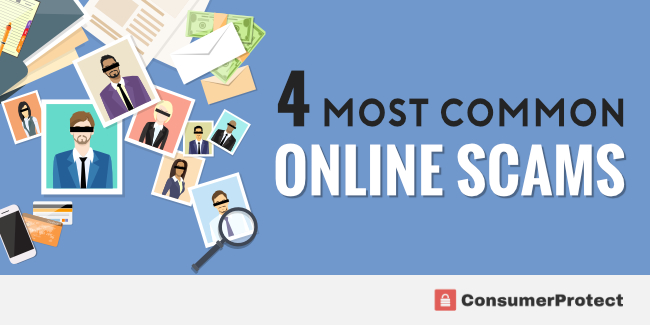For as long as there has been money, there has been scams. Scamming is an illegal way to cleverly take money from people away, and as technology has evolved, the types of scams have evolved, too. Some people still believe that only the naive and gullible will fall for these types of scams. In reality, however, anyone can fall victim, something that has been proven by the fact that millions of dollars are lost each year through scams. Let’s take a look at the four most common online scams.
1. The Nigerian 419 Letter Scam
Most people have, at some point or another, received an email from a wealthy family in Nigeria. They contact you saying they are desperate for help, as they need to be able to get money out of the country. The exact story varies, but will always be emotive in the hopes of snaring you in. No matter what the story is, the Nigerian scam always promises you obscenely high amounts of money for helping. If you fall for the highly emotive story, you will be asked to transfer some money to cover a variety of fees that are required to release the money. More fees and bribes will be required as time passes by and they will continue to come up with reasons as to why you have to pay more and they will continue with this until you finally refuse to pay any more. Naturally, you will never see the money that has been promised. The scam itself is actually very old, having started in the 1558 as the Spanish Prisoner Con.
2. Advanced Fees Paid For a Guaranteed Loan or Credit Card
You will probably have received emails offering you a ‘pre-approved’ credit card or loan. If you have ever taken this any further, you will notice that you will be charged a fee to actually receive the loan or credit card. Ask yourself why a bank would charge you a fee to send a card out to you. While genuine credit cards may charge you fees, this is not something you have to pay in advance, but rather something that is built into your credit card balance. Sometimes, a pre-approved credit card or loan scheme is very obvious.
“There have been over 300 complaints filed with BBB in the past three years, and over 100 of those have been reported this year.”
If for instance, you are claiming welfare but are offered an affordable mortgage for a million dollar property, you will probably guess that it is a fake. But most are less obvious than that and they target vulnerable people who live in poverty and are therefore more likely to need some sort of financial relief.
3. Lottery Scams
There are few people on this planet who wouldn’t like to have enough money to never have to work again, preferably at a young age. You may have received an email at some point in your life that stated that you have been the winner of a huge sum of money in some form of foreign lottery. These emails seem genuine and while the amounts are obscenely high, they are no higher than what can be won in our own lotteries. This makes them very credible. If you reply to the email to claim your winnings, you will be asked to pay a few thousand dollars in fees first. Just as with the Nigerian letter, the fees will keep on coming until you will pay no more. It is vital that you report this scam to your local law enforcement professionals for two reasons. First of all, all scams should be reported to stop them from happening again. Secondly, taking part in a foreign lottery is actually illegal. This is also a big clue to point to the fact that the email is a scam.
4. Phishing Emails and Phony Web Pages
Phishing scams are the most common scams online. Before the internet, there used to be ‘sting’ cons, and phishing is essentially the digital alternative for this. Through the scam, you are tricked into divulging personal information such as your passwords and emails. The way they manage to do this is by posing as a trusted source. For instance, in a phishing scam.
“Pronounced like fishing, phishing is a term used to describe a malicious individual or group of individuals who scam users.”
You may receive an email from your bank, PayPal or the IRS, stating that there is some sort of issue with your account that means you urgently have to log in. If you click on the attached link, you will be taken to a website that looks just like the site it claims to be, where you will be asked to ‘confirm’ your identity. In reality, you are not confirming anything, you are simply giving it away. There are a few red flags to look out for when it comes to phishing. First of all, it is unlikely that the email will actually be addressed to you personally. Rather, it will open with something like ‘Dear customer’ or ‘To whom it may concern’. You should also find that if you hover over the link, it will not start with https://, rather it will miss the ‘s’. If you are ever in doubt, you should telephone the financial institution that the email claims to be from and check whether it is genuine or not.
These are just four of the many scams that are out there. By knowing they exist, you may increase your chances of avoiding them. Unfortunately, people have been victimized by scams for thousands of years and it is likely that this will continue for thousands more.






